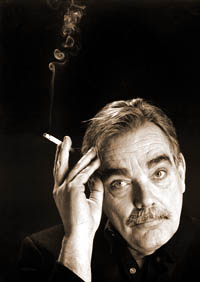Those Graves in Rome There are places where the eye can starve,
But not here. Here, for example, is
The Piazza Navona, & here is his narrow room
Overlooking the Steps & the crowds of sunbathing
Tourists. And here is the Protestant Cemetery
Where Keats & Joseph Severn join hands
Forever under a little shawl of grass
And where Keats' name isn't even on
His gravestone, because it is on Severn's,
And Joseph Severn's infant son is buried
Two modest, grassy steps behind them both.
But you'd have to know the story--how bedridden
Keats wanted the inscription to be
Simple, & unbearable: "Here lies one
Whose name is writ in water." On a warm day,
I stood here with my two oldest friends.
I thought, then, that the three of us would be
Indissoluble at the end, & also that
We would all die, of course. And not die.
And maybe we should have joined hands at that
Moment. We didn't. All we did was follow
A lame man in a rumpled suit who climbed
A slight incline of graves blurring into
The passing marble of other graves to visit
The vacant home of whatever is not left
Of Shelley & Trelawney. That walk uphill must
Be hard if you can't walk. At the top, the man
Wheezed for breath; sweat beaded his face,
And his wife wore a look of concern so
Habitual it seemed more like the way
Our bodies, someday, will have to wear stone.
Later that night, the three of us strolled,
Our arms around each other, through the Via
Del Corso & toward the Piazza di Espagna
As each street grew quieter until
Finally we heard nothing at the end
Except the occasional scrape of our own steps,
And so we said good-bye. Among such friends,
Who never allowed anything, still alive,
To die, I'd almost forgotten that what
Most people leave behind them disappears.
Three days later, staying alone in a cheap
Hotel in Naples, I noticed a child's smeared
Fingerprints on a bannister. It
Had been indifferently preserved beneath
A patina of varnish applied, I guessed, after
The last war. It seemed I could almost hear
His shout, years later, on that street. But this
Is speculation, & no doubt the simplest fact
Could shame me. Perhaps the child was from
Calabria, & went back to it with
A mother who failed to find work, & perhaps
The child died there, twenty years ago,
Of malaria. It was so common then--
The children crying to the doctors for quinine.
It was so common you did not expect an aria,
And not much on a gravestone, either--although
His name is on it, & weathered stone still wears
His name--not the way a girl might wear
The too large, faded blue workshirt of
A lover as she walks thoughtfully through
The Via Fratelli to buy bread, shrimp,
And wine for the evening meal with candles &
The laughter of her friends, & later the sweet
Enkindling of desire; but something else, something
Cut simply in stone by hand & meant to last
Because of the way a name, any name,
Is empty. And not empty. And almost enough.
Larry Levis**************************************
![]()
 Larry Levis was a native of California and was educated at California State University at Fresno, Syracuse University, and the University of Iowa. During his life, he published five collections of poems, the most recent of which was The Widening Spell of the Leaves (1991), and a posthumous collection of poems, Elegy (1997), as well as a book of short stories, Black Freckles (1992). In 2000, the University of Pittsburgh Press published The Selected Levis: Poems 1972-1992; and in 2001, the University of Michigan Press's Poets on Poetry Series issued The Gazer Within, edited by Randy Marshall, Andrew Miller, and John Venable. At the time of his death in 1996, Levis was professor of English at Virginia Commonwealth University. He had taught previously at the University of Missouri, the University of Utah, and the University of Iowa, as well as in the Warren Wilson Creative Writing Program. His awards include the U.S. Award of the International Poetry Forum, a Lamont Prize, and selection for the National Poetry Series. Levis received fellowships from the National Endowment for the Arts and the John Simon Guggenheim Memorial Foundation and an individual artist's grant from the Virginia Commission for the Arts. In 1989, he was a senior Fulbright fellow in Yugoslavia. His work appeared in American Poetry Review, The Southern Review, Field, and The New Yorker, as well as in other magazines
Larry Levis was a native of California and was educated at California State University at Fresno, Syracuse University, and the University of Iowa. During his life, he published five collections of poems, the most recent of which was The Widening Spell of the Leaves (1991), and a posthumous collection of poems, Elegy (1997), as well as a book of short stories, Black Freckles (1992). In 2000, the University of Pittsburgh Press published The Selected Levis: Poems 1972-1992; and in 2001, the University of Michigan Press's Poets on Poetry Series issued The Gazer Within, edited by Randy Marshall, Andrew Miller, and John Venable. At the time of his death in 1996, Levis was professor of English at Virginia Commonwealth University. He had taught previously at the University of Missouri, the University of Utah, and the University of Iowa, as well as in the Warren Wilson Creative Writing Program. His awards include the U.S. Award of the International Poetry Forum, a Lamont Prize, and selection for the National Poetry Series. Levis received fellowships from the National Endowment for the Arts and the John Simon Guggenheim Memorial Foundation and an individual artist's grant from the Virginia Commission for the Arts. In 1989, he was a senior Fulbright fellow in Yugoslavia. His work appeared in American Poetry Review, The Southern Review, Field, and The New Yorker, as well as in other magazines**************************************
:hi:
RL